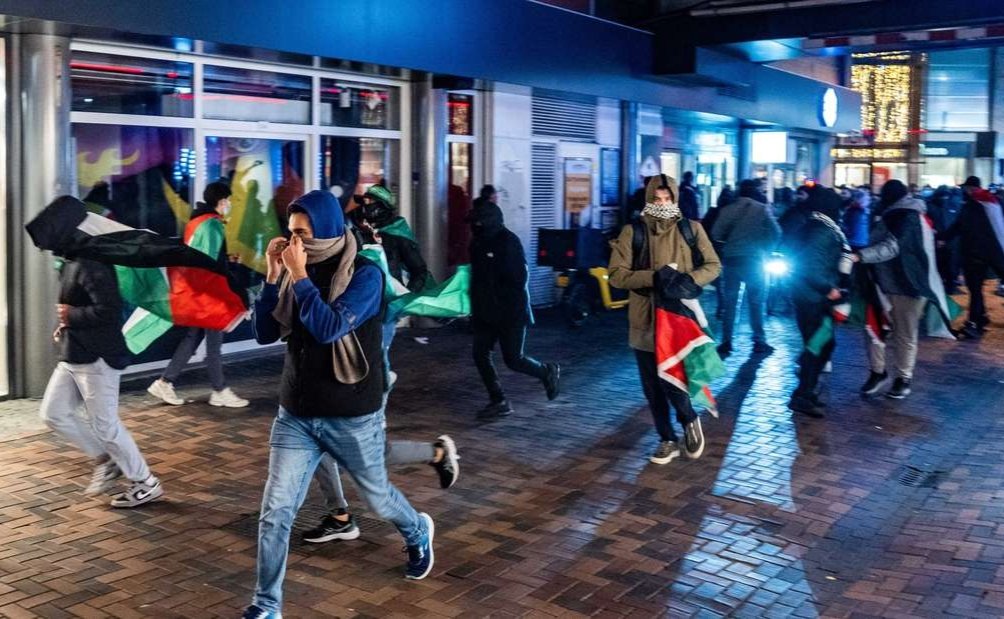On November 8, 2024, a significant and alarming incident occurred in Amsterdam, where groups of young Arabs reportedly assaulted Israeli soccer fans who were in the city to watch a match between Maccabi Tel Aviv and Ajax. This coordinated attack has led to serious questions regarding the preparedness and response of Dutch authorities, with Freedom Party leader Geert Wilders calling for drastic measures, including potential mass deportations of what he termed “immigrant Jew-Haters.” The attacks were characterized as premeditated, with Israeli fans being hunted down in the streets, further exacerbated by apparent inaction from law enforcement, which had received warnings from Israeli security about the potential for violence.
The assaults captured on social media showcased a troubling scene where groups, armed with knives and baseball bats, used violence against Israeli supporters, with reports suggesting at least 25 injuries among Israeli fans. Eyewitness accounts indicated that the attackers were organized, gathering in strategic locations such as train station exits and popular squares in Amsterdam. The situation quickly escalated into chaos, with fans beaten, some nearly left unconscious, while police appeared to stand by, igniting outrage among those witnessing the events unfold. Despite the alarming nature of the incidents, official reports from the Dutch authorities acknowledged fewer injuries than suspected, indicating a possible underreporting of the violence.
In light of these attacks, the Israeli government took immediate action, sending chartered flights to Amsterdam to assist in rescuing its citizens amidst the escalating violence. The Israeli Embassy issued a stark warning, advising Jews in the region to shelter in place and avoid revealing their identities due to safety concerns. Those familiar with the situation noted that the warnings from the Israeli security service Shin Bet to bolster police presence were overlooked, a failure that has drawn significant criticism from various quarters, particularly by political leaders like Wilders. The lack of adequate protective measures fostered an environment of fear and uncertainty among the Jewish community in Amsterdam, many of whom felt abandoned by local law enforcement.
As the events unfolded, Wilders used social media to express his outrage and demand accountability from Dutch officials. He challenged the adequacy of the security measures in place, questioning the decision-making processes that led to such a clearly avoidable situation. In his tweets, he emphasized the seriousness of attacking a demographic based on their religion and nationality, highlighting an ongoing struggle against what he perceives as rising antisemitism in Europe. Wilders’ emotional responses struck a chord, resonating with other citizens who began to voice their own fears regarding public safety and the handling of immigration and integration issues in light of recent events.
Wilders’ statements drew on historical precedent, invoking the phrase “Never again,” which references the Holocaust and broader persecution of Jewish people. He stated emphatically that the attacks in Amsterdam resembled a “pogrom,” essentially denouncing the attacks as not merely isolated incidents, but rather a symptom of a larger, systemic issue manifesting in growing antisemitism within society. His call for urgency in the response to these incidents underscored a call for a more robust approach to tackling crime associated with radicalized elements in immigrant communities, adding to the complexities of social cohesion in a multicultural society.
The aftermath of the attacks raised numerous discussions around police effectiveness, public safety, and the societal implications of rising tensions surrounding the Palestinian-Israeli conflict within Europe. Amid calls for mass deportations and stronger national security measures, critics cautioned that such actions could deepen societal divides and exacerbate tensions between different cultural groups. Moving forward, it remains crucial for both law enforcement and community leaders to navigate these challenges in a manner that promotes safety and understanding, while also ensuring the rights of all citizens are respected amidst growing fears and magnitude of anti-Jewish sentiment across the continent.

